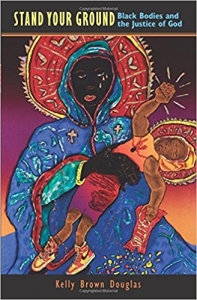I have a horrible habit of buying textbook rentals at the end of the semester. Every semester, I try to figure out which books I’ll want in the future, then inevitably miss three or four that I decide I need after reading them. These are books that I found have made my college experience all the more valuable and engaged me at my core. Because each discipline has books that change perspectives, I’ll also be featuring other books (and some articles) from other disciplines and professors that matter to students at Goucher. Below, I’ve named my top three books from courses in Psychology and English. I hope to add books from others in the future. In the meantime, feel free to add these three to your to-read list!

Stand Your Ground by Kelly Brown Douglas
Genre: Non-Fiction
Read for: Rick Pringle, Relational Psychology, Spring 2017
Summary: Kelly Brown Douglas examines the history of Stand Your Ground laws in the wake of the shooting of Trayvon Martin and considers the contradiction that exists within Black Faith.
Why: This summary is far too simple to address the whole of Douglas’ discussion, but that’s mainly because the issues Douglas confronts are far too complex for a one sentence summary. While Stand Your Ground is certainly a dense read, it provides incredible and important insight into how systemic racism came to be a part of our judicial systems and our media. It certainly covers a dark history, but the book is overall hopeful that these issues within our society can be fixed, if only enough people acknowledge the horrors in our past that have lead to our horrors in the present.
The White Tiger by Aravind Adiga
Genre: Fiction
Read for: Antje Rauwerda, Contemporary World Literature, Fall 2016
Summary: The White Tiger follows Balram Halwai as he plays by, as well as breaks, the rules to rise up within India’s caste system through becoming a driver for one of the wealthiest families from his village.
Why: As a whole, I’d highly suggest all of the books on Professor Rauwerda’s syllabus, primarily because all of the books give context to cultures and countries that are often ignored within our society. The main reason I suggest The White Tiger out of all of the books on this list, however, is because it requires the least background research out of the 5 novels we read. The White Tiger is also a really interesting read, with the crude and honest first person narration of an unreliable narrator. I found Balram engaging, not entirely likable, but a character that continuously shocked without appearing inconsistent or unrealistic. Additionally, if you’re a fan of animal symbolism, this book is right up your alley.
In the Lake of the Woods by Tim O’Brien
Genre: Fiction
Read for: Rick Pringle, Relational Psychology, Spring 2017
Summary: Told in three main formats— an evidence section of quotes, a proposed narration, and footnotes— the narrator attempts to discover the truth of what happened to John Wade, Vietnam Veteran and former US politician, and his wife when they attempted to slip away from the public eye in a tiny cabin in Lake of the Woods.
Why: This book beautifully demonstrates the view of the truth as nebulous and subjective. Throughout it, many people are quoted as supposedly knowing exactly what happened the night John’s wife, Kathy, disappeared. In the end, however, true evidence is scarce, and it is up for the reader to determine what qualifies as being true. For those who love slow build mystery, unique book formats, and footnotes, In the Lake of the Woods is an absolute must.
